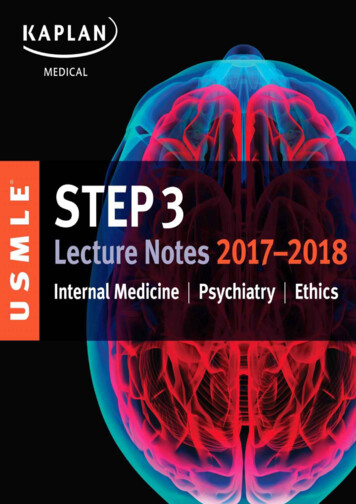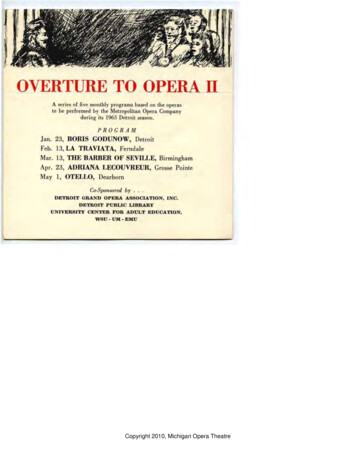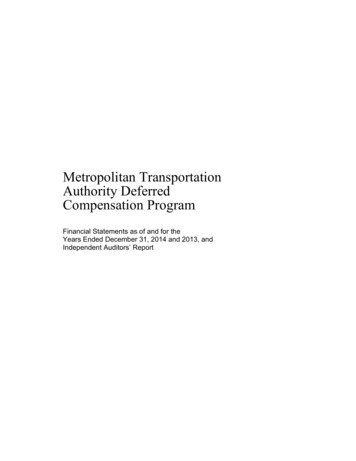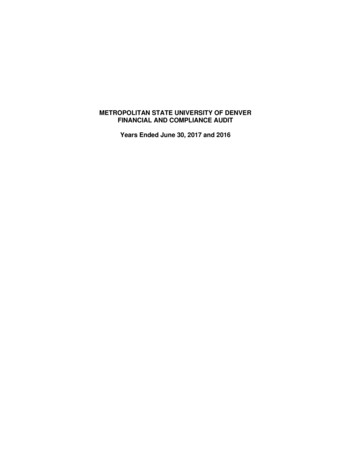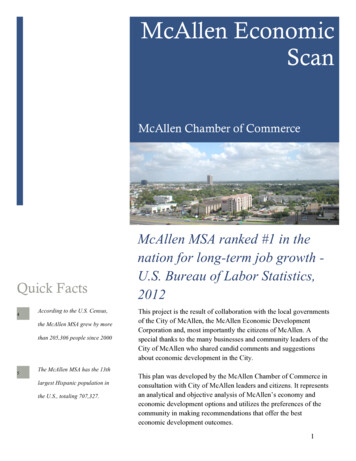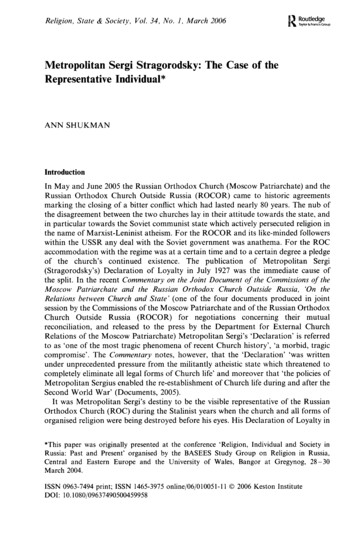
Transcription
Religion, State & Society, Vol. 34, No. 1, March 2006Metropolitan Sergi Stragorodsky: The Case of theRepresentative Individual*ANNSHUKMANIntroductionIn May and June 2005 the Russian Orthodox Church (Moscow Patriarchate) and theRussian Orthodox Church Outside Russia (ROCOR) came to historic agreementsmarking the closing of a bitter conflict which had lasted nearly 80 years. The nub ofthe disagreement between the two churches lay in their attitude towards the state, andin particular towards the Soviet communist state which actively persecuted religion inthe name of Marxist-Leninist atheism. For the ROCOR and its like-minded followerswithin the USSR any deal with the Soviet government was anathema. For the ROCaccommodation with the regime was at a certain time and to a certain degree a pledgeof the church's continued existence. The publication of Metropolitan Sergi(Stragorodsky's) Declaration of Loyalty in July 1927 was the immediate cause ofthe split. In the recent Commentary on the Joint Document of the Commissions of theMoscow Patriarchate and the Russian Orthodox Church Outside Russia, 'On theRelations between Church and State' (one of the four documents produced in jointsession by the Commissions of the Moscow Patriarch ate and of the Russian OrthodoxChurch Outside Russia (ROCOR) for negotiations concerning their mutualreconciliation, and released to the press by the Department for External ChurchRelations of the Moscow Patriarchate) Metropolitan Sergi's 'Declaration' is referredto as 'one of the most tragic phenomena of recent Church history', 'a morbid, tragiccompromise'. The Commentary notes, however, that the 'Declaration' 'was writtenunder unprecedented pressure from the militantly atheistic state which threatened tocompletely eliminate all legal forms of Church life' and moreover that 'the policies ofMetropolitan Sergius enabled the re-establishment of Church life during and after theSecond World War' (Documents, 2005).It was Metropolitan Sergi's destiny to be the visible representative of the RussianOrthodox Church (ROC) during the Stalinist years when the church and all forms oforganised religion were being destroyed before his eyes. His Declaration of Loyalty in*This paper was originally presented at the conference 'Religion, Individual and Society inRussia: Past and Present' organised by the BA SEES Study Group on Religion in Russia,Central and Eastern Europe and the University of Wales, Bangor at Gregynog, 28-30March 2004.ISSN 0963-7494 print; ISSN 1465-3975 online/06/010051-11 2006 Keston InstituteDOl: 10.1080/09637490500459958
52Ann Shukman1927 split the ROC, some seeing it as a betrayal, others agreeing with him that it wasthe only way to maintain the ROC in some kind of public existence. In 1930, at a timeof heightened persecution, Sergi made the shocking announcement that there was noreligious persecution in the USSR. Many questions arise about Metropolitan Sergiand his motivation. Was he just a Soviet stooge? Did he betray the ROC or save it?Was he a faint-hearted conformist, or a living martyr? In this paper I refer to recentscholarship on Sergi with the aim of contributing to an up-to-date assessment of thiscentral personality in the twentieth-century history of the Orthodox Church, a bridgefigure whose career spanned the old regime and the Soviet years and culminated in hiselection as patriarch under Stalin in 1943.Sergi's Early CareerThe future Patriarch Sergi (Ivan Nikolayevich Stragorodsky) was born in Arzamas in1867 into a family whose members had been provincial parish priests for severalgenerations, but young Ivan Stragorodsky showed exceptional promise and opted notfor the 'white' clergy the married parish priests but for the 'black' clergy, themonastics who could hope to rise to be bishops. He had a meteoric career, becomingrector of the Russian embassy church in Athens by the time he was 27 and serving inthe Japan Orthodox Mission before returning to teach at the Theological Academy inSt Petersburg. In 1901 he was appointed rector of the Academy, the top teaching post,and the same year was consecrated bishop. He was still only 34. IThe Religious-Philosophical MeetingsIn that same year of 1901 his name became more widely known to the general publicin St Petersburg when he was appointed chairman of the newly formed 'ReligiousPhilosophical Meetings'. These famous meetings, which were set up on the initiativelargely of Dmitri Merezhkovsky and his wife Zinaida Gippius, became for nearly twoyears the forum where members of the intelligentsia who were seeking to explore theirfaith could meet representatives of the ROC for discussions in an attempt to bridgethe 'cultural abyss' which separated them. 2 It was the first time ever that the officialrepresentatives of the ROC had deigned to meet the intelligentsia in such a way.Bishop Sergi is described at this time as follows[T]his gentle cleric with his long red hair and pale, puffy face was wellqualified for his task, being possessed of a subtlety of mind and breadth ofvision without which the debates must have reached deadlock or fallen foulof the State long before they did. Nevertheless his appearance was strange,and the opening speech must have sounded somewhat forbidding. (Pyman,1984, p. 198)Zinaida Gippius, in a fit of frustrated pique, referred to the church representatives atthe meetings as 'little-cultured half-Buddhists, barbarous ill-tempered ascetics ofthought . thorough-going positivists' (Pyman, 1984, p. 201); but Bishop Sergihimself seems to have won the admiration of the company and at the very least keptthe meetings going over 20 sessions. 3 His official biographer comments, 'Of all theclergy participants at the meetings Bishop Sergi held to the most radical position,admitting in principle freedom of conscience and the need to separate the churchfrom the state' (Savich, 1947, p. 26), and goes on to recount how at the end of the
Metropolitan Sergi Stragorodsky53seSSIOns the members rose to their feet to express their warm gratitude to him,sayingThe spirit of the shepherd rested on the flock and determined the happyand quite unexpected success of the meetings . We expected nothing butmisunderstandings, irritation and cross-purposes . Instead of a hierarchand a chairman we saw before us a Christian . and so an exceptionalatmosphere was created for the sincere exchange of ideas. (Savich, 1947,pp. 26-27)Dixon comments on Sergi's contributions to these meetings:Sergii's contributions to these assemblies not only marked him out as anexceptionally articulate spokesman for his faith, but also served to intensifyhis sense of belonging to a church under pressure. The transcript of the eighthsession, on freedom of conscience, testifies to the young bishop's outlook onissues that were soon to overshadow his reign in Finland. 'We are not sonaive as to confuse religion with nationality [natsional'nostT . But he wenton to say that 'faith has contributed so much to Russian nationality that if aRussian ceases to be Orthodox, then he loses so much of his inner contentthat he ceases to be Russian.' (Dixon, 2004, p. 54)If the immediate outcome of these meetings was inconclusive, seeds were sown and inlater years in emigration and at home many of the participants from the intelligentsiawere to become adherents of the ROC (to mention only Rozanov and Berdyayevamong the best known).The Last Years of the Tsarist RegimeBishop Sergi's skills in diplomacy and negotiation were apparent also in his abilityto play 'ecclesiastical politics' - how to get on both with the formidable archconservative, the Chief Procurator of the Holy Synod, Konstantin Pobedonostsev,and with the reformist Metropolitan Antoni (Vadkovsky) of St Petersburg, hisimmediate superior, friend and ally. He is described by Firsov as 'an ideal churchmanof the Russian Orthodox Church in its Petrine model' (Firsov, 2002, p. 23), that is, achurchman brought up on the principles of obedience to the state, and probablywithout much conception of what freedom of the church from the state might inreality be like. But he had a lively mind and formed his own judgments. His belief inthe piety of the Russian people led him at one time to take up the cause of Rasputin,seeing in him an example of a popular starets. Later he became disillusioned withRasputin and thereby incurred the hatred of the tsarina and the dislike of the tsar,factors which at a certain moment may have cost him the nomination to the post ofmetropolitan of St Petersburg, a position to which one might have expected his talentswould have led him.In October 1905, however, Bishop Sergi was consecrated to the prestigious post ofarchbishop of Finland and Vyborg. 4 In 1911 he was appointed to the Holy Synod, thegoverning body of the ROC, and in 1912, most significantly for the future, he becamechairman of the commission to prepare for the long-awaited Local Council, thoughthis was not convened until after the fall of the monarchy five years later. His was avoice to be reckoned with in the upper ranks of the church authorities. 5
54Ann ShukmanThe Local Council (Pomestny Sobor)As things turned out, the fall of the monarchy, the collapse of the ProvisionalGovernment, the seizure of power by the Bolsheviks and the opening of the LocalCouncil created entirely new circumstances for which little in Bishop Sergi'sexperience could have prepared him.The Local Council immediately introduced the principle of election (to theconsternation of most of the bishops). Although he had been one of the chieforganisers of the Local Council, Bishop Sergi was not popular in spite (or perhapsbecause) of his prominence under the old regime. In the voting for patriarch hereceived only four votes out of 309: the lot fell to Tikhon. He also failed to be electedmetropolitan of Petrograd (that post went to Veniamin) and gained only the lesserposition of archbishop of Vladimir, though soon becoming a member of the new HolySynod.The First Soviet YearsBy an irony of history, the advent to power of the Bolsheviks coincided with firstmoment of freedom of the ROC from state control for over two centuries: the openingof the Local Council in December 1917 led to the election of Tikhon as patriarch andthe introduction of many long-overdue church reforms, including the election ofbishops. But this newly liberated church immediately faced the enormous problems ofadaptation and survival under the Soviet regime.The Local Council was forced to close in September 1918. We have no preciseaccount of Bishop Sergi's activities over the next few years. There is evidence that heclung to his belief in negotiation in dealing with the local soviets. Perhaps his successeswith the wilder fringes of the Silver Age intelligentsia, as with the old churchhierarchy, led him to believe that negotiation was possible with all manner of people.Besides which, he no doubt failed at first to realise the full implication of Bolshevikatheist ideology, and if he did take note of the ideology in the general maelstrom ofideas that the Revolution whipped up, he almost certainly failed to comprehend thephysical ruthlessness with which that ideology would be applied against churches,their treasures, and church people. For instance, he urged his people to cooperatewith, and not resist, the local soviets when they came to seize valuables. 6 Firsovcomments: 'In my opinion this was very typical of him: he always tried to win a"tactical" victory which often did not result in a "strategic" success and often turnedout to be pyrrhic' (Firsov, 1999, p. 48).We may assume also that he did not fully grasp the deliberate intention of theBolshevik government to destroy the church, and with it the authority of thepatriarch, when in 1922 it created the anti-patriarchal splinter group, the so-calledRenovationists. To everyone's surprise (both at the time and to historians today)Sergi immediately joined this schismatic group, thereby lending it greatly addedauthority. Perhaps with the arrest of Patriarch Tikhon in May 1922, and his yearlong imprisonment, not to mention the show trial and execution of MetropolitanVeniamin of Petrograd in the summer of 1923, Sergi thought the Renovationistsheld the secret of accord with the new civil authority, and anyway by the end of1923 the canonical patriarchal church seemed barely to exist (See Firsov, 1999,p. 80, quoting Krivova, 1997). Whatever the reasoning that made him join - and itwas an action that was held against him in some quarters for the rest of his life - Sergichanged his mind and was reconciled to Tikhon once the patriarch was released
Metropolitan Sergi Stragorodsky55from prison at the end of 1923. The scene of the reconciliation is described in a recentpopular book on the Patriarch:Metropolitan Sergi of Vladimir and Shuisk, that brilliant theologian andcanon lawyer, following whose example hundreds of bishops and priestshave become Renovationists, stands on the amvon, stripped of hisarchiepiscopal cope, mitre, panagia, and cross. He bows low to PatriarchTikhon, acknowledging his submission and his guilt, and in a voicetrembling with emotion he recites the confession. He prostrates himself onthe floor . Slowly the patriarch hands him back his panagia and the cross,his white mitre, his cope and his staff. The patriarch, who all this while hasbeen looking at him sternly and sorrowfully, breaks into a smile, teasinglytakes the penitent by his beard, and shaking his head, says, 'You too, oldboy, you too broke away from me.' ['I ty, stary, ot menya otkololsya'].Thereupon the two old men, no longer containing their emotion, weep andembrace each other. (Vostryshev, 1997, pp. 274-75fThe Patriarchal SuccessionSergi was rewarded with the bishopric of Nizhni Novgorod and from this timeonwards he became the embodiment of the patriarchal principle of churchgovernment, the individual who represented the canonical church against all thenumerous splinter groups, pro-Bolshevik and anti-Bolshevik, pro-patriarchal andanti-patriarchal, that sprang up at home and in the emigration. But above and beyondthat he was the one representative of the ROC who was most committed to reachingan accord with the existing civil authority. His principles were to be tested to the limit.In early 1925, Patriarch Tikhon, in poor health and fearing for the patriarchalsuccession, nominated three senior bishops to succeed him as locum tenens in the eventof his death and until such time as the next Local Council could be convened. Forsome reason, presumably because of his recent apostasy, these three did not includeSergi. Two of the three nominees (Metropolitans Kirill and Agafangel) were already inexile. The third, Metropolitan Petr (Polyansky), aware of the cat and mouse gamebeing played by the authorities against the church, in his turn nominated Sergi to behis deputy. When Patriarch Tikhon died in March 1925, Metropolitan Petr tookcharge of the church as locum tenens, but in December of the same year he too wasarrested. So it came about that from the end of 1925 Bishop Sergi as deputy locumtenens 8 became canonical head of the church for the next 18 years.The Struggle for Legal RecognitionThe ROC, inasmuch as it existed at all at this period, existed on a 'semi-legal' basis. Inthe circumstances of the time, it was impossible to convene a Council: Bishop Sergihimself was confined to Nizhni Novgorod, many of the hierarchs were in prison orexile, communication between them was barely possible. Bishop Sergi believed that hisprime task was to get the central authority of the church legally recognised so that itwould have the right to convene a Local Council at which the next patriarch could beelected. At that time both the Renovationists and another splinter group, theGrigorians, had legal status. To achieve this aim Bishop Sergi was prepared to makeconcessions. In the months that followed he entered into negotiations with the security
56Ann Shukmanservices, which were in fact controlling church affairs at the time while fomentingsplits and rivalries between the various hierarchs (Tsypin, 1997, pp. I 27ff. ). Sergi hadto deal in particular with the head of the Sixth (religious) Section of the OGPUjNKVD, a certain Yevgeni Tuchkov. Tuchkov, who was in his early thirties, had hadvirtually no formal education: he had risen up through the party organisation fromthe industrial town of Ivanovo-Voznesensk. He was one of new iron men of theBolshevik party, determined to use all his skills and cunning to undermine the churchand to eradicate all trace of the opium of the people. What, one might wonder, had ledsuch a young man to be concerned with the church? The archives recently opened haverevealed that Tuchkov's nickname in the force was 'Igumen', that at this period he wasliving with his deeply religious mother at the Moscow branch-house on PervayaMeshchanskaya street of the Diveyevo convent (the community founded bySt Serafim of Sarov), where a few sisters remained. Thanks to Tuchkov's presencethe house remained open longer than other monastic branch-houses in the capital(Firsov, 1999, pp. 201-2).Through 1926 and the first months of 1927 Sergi's duel with Tuchkov ran its course:the one-time prince of the church, erudite, loaded with honours, face to face with theuneducated Bolshevik tough guy half his age. But Tuchkov had force on his side. Sergiwas taken periodically into custody (some sources say four times, others twice), and hewas allegedly threatened with the life of his sister, a nun, and with the lives of otherbishops and priests (at that time 117 Orthodox bishops were in prison). In the endagreement was reached and the Declaration of Loyalty was released in July 1927. 9The Declaration of LoyaltyBishop Sergi, it seems, had won legal recognition for the central authority of the ROC,and hence the right to existence of the Synod of Bishops. So now, Sergi addressed hisflock:We want to be Orthodox and at the same time recognise the Soviet Union asour civil motherland, whose joys and successes are our joys and successes,and whose failures are our failures . While remaining Orthodox weremember our duty to be citizens of the Union 'not only by fear . but byconscience'. (Romans 13.5)10The text continues:Many people thought that the establishment of Soviet power was a mistake,a chance occurrence, and as such would not last long. People forgot that forthe Christian there is no such thing as chance, and that in what is happeninghere, as everywhere and always, the Hand of God is at work.It was an illusion, he continued in a reference to the catacomb church, to think that 'avast society such as our Orthodox Church . could continue to exist peacefully in astate while hiding itself from the authorities' (Patriarkh, 1947, pp. 61-62).The Declaration did not tell the full story. Sergi had conceded the right of theauthorities to control the appointment and placement of all bishops, that is in fact forthe security services to have control of the most central of all church matters(Mitrofanov, 2002, pp. 389-90). He may have appeared to have averted the takeoverof the church as an institution from within, which since 1922 had in fact been the
Metropolitan Sergi Stragorodsky57objective of the state security organs (Firsov, 1999, pp. 72 - 73), but in reality he hadyielded on this very point, giving the security services power to control all decisions inchurch life. I IEven to those who did not know this hidden agenda, the Declaration was widelyregarded as a sell-out. It split the ROC immediately into those who followed BishopSergi and remained above ground and legal, and those who went underground andcontinued a hidden existence as the catacomb church. Could Sergi have anticipatedwhat was to come? The Declaration gave the church a bare two years' breathing space:in 1929 all church activity except for the celebration of the liturgy was banned. In 1932came the First Five Year Plan of Atheism. These were the years of likholetiye, ofimmense social upheaval, of famine, of fear. By the time of the outbreak of war in1941 the church had suffered two devastating waves of persecution (1929-32 and1935 - 38). Only four senior clergy were left at liberty and one of them was Sergi. It ishard (even impossible) to imagine how Sergi survived those years and what his innerfeelings were. In 1930 he made a humiliating public announcement that there was noreligious persecution in the USSR, though there is some evidence that he was forced tomake this announcement under threat of the mass arrest of all the remainingbishops. 12But his spirit was not destroyed. When the Germans invaded in June 1941, andStalin panicked and remained silent, it was Sergi who issued a call to the faithful todefend their country. His reward was to come in September 1943 when he and twoother old and broken clerics were summoned to the Kremlin and ordered to restart thechurch.The Revival of the Patriarchate in 1943Stalin's motives for the reestablishment of the Patriarchate in the summer of 1943, at amoment when the tide of war had turned in favour of the Soviet Union, were complex.The regime needed a centralised church authority Ca Vatican of sorts' as Stalin issupposed to have said to Metropolitan Sergi) in order to deal with the reconqueredwestern lands of the Soviet Union with their many churches, in order to give authorityto the Russian Church over the autocephalous churches of the adjacent countries, andin order to bolster western support for the war effort. In particular a delegation fromthe Church of England, led by the Archbishop of York, was due to arrive in Moscowin September.Metropolitan Sergi had been evacuated to Ul'yanovsk in the autumn of 1941. Theconditions there were harsh: a photograph of him in July 1943 shows him sitting withMetropolitan Aleksi, both old men gaunt and hollow-cheeked (Patriarkh, 1947,photograph facing p. 240). But his fortune was about to change dramatically.In July 1943, apparently unknown to him, the head of the NKVD, Merkulov,advised the Party that he should be returned to Moscow in order for him to maintaincontrol of the churches now being liberated in the west (Miner, 2003, p. 124). InAugust Metropolitan Sergi and his staff returned to Moscow. At some point that samesummer, Stalin, Molotov, Beria and Malenkov took the decision, without apparentlyconsulting any of the church hierarchs, that the Patriarchate should be restored(Miner, 2003, p. 124). On 4 September Stalin held a special meeting with the NKVDcolonel Grigori Karpov to question him about the church and its personnel and toestablish the formation of a Council to control the church. Two hours later Karpovtelephoned Sergi to ask when he could come to a meeting with Stalin. Sergi answered'today', and so Sergi together with Metropolitans Nikolai (Yarushevich) and Aleksi
58Ann Shukman(Simansky), were driven that evening by limousine to the Kremlin and ushered intothe presence of Stalin for a momentous meeting that lasted just under two hours(Pospielovsky, 1997, pp. 140-41).13 Together with Stalin in the room were Molotov,the foreign secretary, and Karpov. It seems that Sergi had had no previous meetingwith Stalin,14 but from the readiness with which he put his demands it seems that hemust have had some inkling of what was to come, and certainly his wits wereabout him.Stalin invited his guests to say what the needs of the church were. Sergi answeredthat the most urgent matter was to convene a Synod of bishops which could elect apatriarch (Pospielovsky, 1997, p. 141 and n.5).15 In order to hasten matters (Sergisuggested it would take a month to convene the Synod) Stalin offered aeroplanes tobring the hierarchs to Moscow so that the Synod could take place on 8 September.Sergi refused Stalin's offer of finances. The metropolitans then asked for theologicalcourses to be reopened, to which Stalin responded by offering the right to open atheological academy and seminaries. This the hierarchs rejected, saying they did nothave the personnel. Sergi then asked for permission to publish a journal. Stalinanswered, 'You may and you must publish a journal.' Sergi asked for the right of localbishops to approach local authorities for permission to reopen churches. Stalinapproved this too. Metropolitan Aleksi asked for the exiled and imprisoned hierarchsto be released. Stalin said, 'Give us a list and we will consider it.' In fact of the list of24 names eventually submitted a considerable number had already been liquidated bythe NKVD, a fact which the metropolitans obviously did not know (Pospielovsky,1997, p. 142).16 The conversation touched on various other practical matters (candlemaking factories, finances and the rights of parish priests). Stalin offered patriarchaloffice premises in the former German ambassador's residence, together with cars andspecial rations. Having repeatedly asked the hierarchs if they had any further requests,Stalin then informed them of the formation of a Council for the Affairs of the RussianOrthodox Church which would be headed by Karpov. Karpov records the followingexchange:'How do you react to that?' [asked Stalin]. All three declared they reactedvery positively to the appointment of comrade Karpov to thatposition . Then turning to me [Karpov], comrade Stalin said ' . but justremember firstly that you are not a procurator general, and secondly thatyou must do all you can to underline the independence of the church.'(Zapiska, 2003, p. 262)There is a story, not recorded by Karpov, that Stalin said to the metropolitans,'Where are your personnel? Where have they got to?' Sergi is said to have lookedStalin in the eye and rejoined, 'We lack personnel for several reasons, one of which iswe train a man to be a priest, but he becomes a marshal of the Soviet Union.' Havingthus won Stalin's sympathy, at the end of the meeting Sergi was so exhausted thatStalin himself helped him down the stairs (Miner, 2003, pp. 125 - 27). Karpov merelyconcludes his notes of the meeting with the laconic words, 'This meeting was a historicevent for the church and the great effect it had on Metropolitans Sergi, Aleksi andNikolai was plain to all who knew and saw Sergi and the others in those days'(Zapiska, 2003, p. 263).On 8 September an extraordinary Council (of a mere 19 hierarchs) did indeedassemble, from which a Holy Synod was formed, and the Synod in its turn, on 12September, elected Sergi patriarch of Moscow and all Rus'. Perhaps after all this it is
Metropolitan Sergi Stragorodsky59not surprising that a bare eight months later Patriarch Sergi died quite unexpectedlyof a stroke.Most of what Stalin promised was never fulfilled. The hierarchs themselves weredeeply sceptical about the government's motives and with good reason. The churchhad been called back into existence largely for foreign propaganda purposes, and inthis respect the visit of the Archbishop of York, Or Cyril Garbett, later thatSeptember, was an outstanding success: Or Garbett enthused over the splendours ofOrthodox worship and the crowded churches, and went home to tell the world of thefreedom offered to believers by the Soviet regime (Miner, 2003, pp. 264-70).Taking the longer view it is clear that Sergi did save the ROC, by being itsrepresentative figure, who survived until circumstances made it possible for church lifeto begin again. And after all the Russian Orthodox Church is in existence today. But ifin one sense he saved the church from complete eradication, in another he condemnedit to long years of subservience to the state, introspection and isolation from society.This is what Firsov (1999) in his book Vremya v sud'be describes as the negative legacyof 'Sergianism' (Sergiyanstvo).We cannot assess the man without considering his Christian faith. In the words ofthe 1927 Declaration, he believed that nothing happened by chance, that all is inGod's hands. Metropolitan Veniamin (Fedchenko), who knew him in earlier times,remembers him as having 'a harmonious and balanced nature, even in prerevolutionary times not very prone to talk of "the accursed questions", though hewas constantly thinking of them'. Metropolitan Veniamin remembers him saying 'Inspite of everything, God's world still stands . Governments may change, and stillGod's world endures . Political systems may change and yet it remains. There maybe wars, revolutions, and yet it still stands fast' (Firsov, 1999, p. 55).Metropolitan Sergi's cell servant for the last ten years of his life, Archimandritloann (Razumov), who knew him intimately, describes his prayer practice. He wouldrise unfailingly at five in the morning and say the office. This was followed by Biblestudy in three languages (Hebrew, Greek and Slavonic). Then he was ready to work.He continually practised the Jesus Prayer, and said the evening office before retiring tobed. He used to wake at three in the morning for the 'Twelve Psalms'. He veneratedSt Serafim whom he believed to be his life-long protector, and while the monastery ofSarov was still open used to welcome the pilgrims passing through Nizhni Novgorod.'Everything about him', recalls Fr loann, 'was modest and simple. All his movements,the kind and caring tone of his voice, his good humour and his unfailing equanimityand calmness reflected the depth of his spiritual world and the illumination andconcentration of his mind' (Razumov, 1947, pp. 232-33).However saintly his personal life, we are left with some questions. Was it right tohand over the church to the security services for the sake of its legal existence? Was itright to lie blatantly for the sake of keeping it in being at all? Fr Georgi Mitrofanovpoints out the uniqueness of the situation of the church in the Soviet Union,commenting that Metropolitan Sergi trod a path never before trodden in thehistory of the World Church (Mitrofanov, 2002, p. 400): and who then are we to judgehim?AcknowledgementI should like to express my gratitude to Keston
Metropolitan Sergius enabled the re-establishment of Church life during and after the . Central and Eastern Europe and the University of Wales, Bangor at Gregynog, 28-30 March 2004. . and a chairman we saw before us a Christian . and so an exceptional atmosphere was created for the sincere exchange of ideas. (Savich, 1947, .


